Archaeologists race to excavate an ancient city in northern Iraq
Nathan Steinmeyer June 17, 2022 0 Comments 898 views
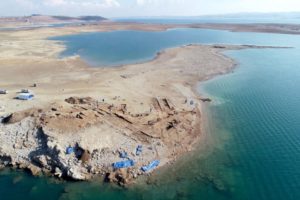

The archaeological site of Kemune, the location of the lost city of Zakhiku, in the dried-up portion of the Mosul reservoir. Courtesy University of Tübingen.
Droughts across Iraq have been a major source of humanitarian concern, but they have also provided archaeologists with a rare opportunity to excavate an ancient lost city. With Iraq suffering extreme drought, the country has been forced to draw large amounts of water from the Mosul reservoir. With the drastic drop in water level, however, a 3,400-year-old city has emerged from the reservoir’s banks. A joint German and Kurdish team was quick to take advantage of the situation and set out to excavate the city. The city is believed to be the ancient city of Zakhiku, an important trade center of the Bronze Age Mitannian empire (c. 1550–1350 B.C.E).
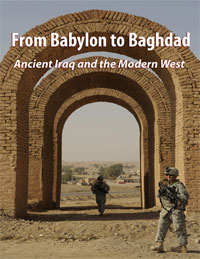

Excavating a Lost City
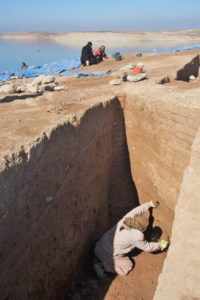

The walls of the Mittani-period storage building are partly preserved several meters high. Courtesy University of Tübingen.
Not knowing when the water level would rise to bury the city once again, the team had only a short window to carry out the excavation. During a similar drought in 2018, a team was able to document a small section of the city’s palace. However, this time around, the team succeeded in mapping a large portion of the city. They also uncovered a massive fortification with walls and towers, a monumental storage building, and an industrial complex. The city walls were remarkably well persevered, to a height of several meters in some places.
According to members of the team, “The huge magazine building is of particular importance because enormous quantities of goods must have been stored in it, probably brought from all over the region. The excavation results show that the site was an important center in the Mitanni Empire.”
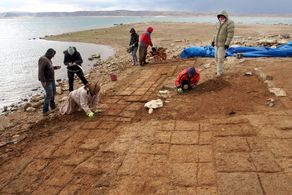

The mudbricks of the Bronze Age buildings are soaked by the water of the reservoir but can are still easily recognizable. Courtesy University of Tübingen.
One of the most remarkable finds from the lost city of Zakhiku was a group of five ceramic vessels that contained an archive of more than 100 cuneiform tablets. The tablets date to the period shortly after the city was destroyed by an earthquake in 1350 B.C.E. and the Assyrians took over the region. Several of the tablets, which are mostly letters, were found in their original clay envelopes. The team hopes these texts will shed light on the end of the Mitanni kingdom and the expanding Assyrian empire. According to excavation direction Peter Pfälzner, “It is close to a miracle that cuneiform tablets made of unfired clay survived so many decades underwater.”
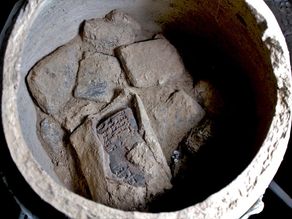

View into one of the pottery vessels with cuneiform tablets, including one tablet which is still in its original clay envelope. Courtesy University of Tübingen.
A Race against the Clock
For several hundred years, the ancient kingdom of Mitanni controlled large parts of northern Mesopotamia and Syria. Today, much of that kingdom is in Iraq’s Kurdistan region, with Zakhiku located around 50 miles northwest of Mosul. The lost city of Zakhiku was first submerged in the 1980s, with the creation of the Mosul reservoir. At the time, no archaeological missions had been carried out at the site.
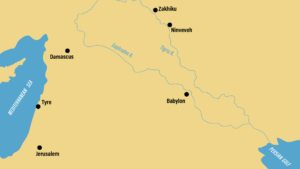

Map showing the location of Zakhiku and several important ancient cities. Courtesy Biblical Archaeology Society.
The recent droughts provided an unexpected opportunity to excavate the ancient lost city before it is once again submerged under water. Fortunately, a group of German and Kurdish archaeologists was able to secure funding for the project and assemble a team within a matter of days. Following the short excavation, the team covered the site with plastic sheeting and gravel. Since then, the site has once again been completely submerged in the reservoir. It is hoped that the tarps and protective fill will help preserve the site until another opportunity for excavation arises.
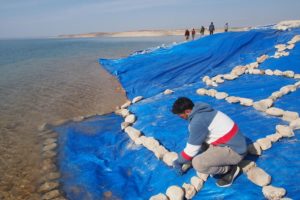

After the research team completed its work, the excavation area was covered with plastic sheeting to protect it from the rising waters of the Mosul reservoir. Courtesy University of Tübingen.
Read more in Bible History Daily:
All-Access members, read more in the BAS Library:
Firsthand Report: Tracking Down the Looted Treasures of Iraq
Assyrian Palace Discovered in Ashdod
Not a BAS Library or All-Access Member yet? Join today.

